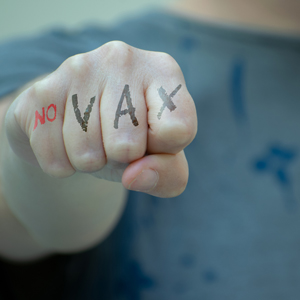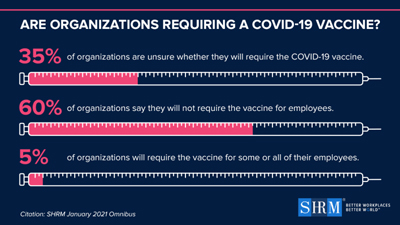
|
As the country slowly but surely begins to open up, the mood surrounding COVID-19 is very hopeful as each day brings more good news about the pandemic winding down. Currently, infections have dropped from 60,000 per day to 30,000, and deaths and hospitalizations from the virus are also going in the right direction—downward.
However, the stats concerning the number of people who have gotten the vaccine could be better—36 percent of adults in the country are vaccinated but 53 percent have not gotten the vaccine, according to numbers reported yesterday by CNN.
It has become apparent that vaccine hesitancy in the U.S. is a thing. According to Dr. Susan Garfield, chief public health officer for consulting firm EY, “vaccination is one of our strongest social contracts in the context of health care. We need folks to start thinking outside their own cells and look at the impact that their own behavior can have on others. Getting vaccinated, especially as a relatively healthy person, is not only protecting you, your family and your community, but it’s particularly protecting those most vulnerable around us, those with underlying health conditions or who are immunocompromised.”
As the country starts to open up and people begin to return to work, the issue of vaccination takes on great importance. For a roundup of how employers and employees are handling the situation, we’ve highlighted some recent articles that offer tips and advice on returning to the workplace.
More Organizations to Encourage COVID-19 Vaccine for Employees, But Gaps Exist Between Employers’ and Employees’ Views
 |
As HR professionals and business leaders look to build a workplace where employees feel safe despite the COVID-19 pandemic, the decision of when and how to return employees to the office has been a pressing challenge. With vaccines for COVID-19 becoming available, business leaders and HR professionals will confront a new set of issues that may make the decision more complicated. New research released in February by SHRM (the Society for Human Resource Management) shows many organizations plan to encourage employees to get the COVID-19 vaccine, yet a significant number of U.S. workers say they are unlikely to get vaccinated.
According to SHRM's survey of HR professionals and U.S. employees, 60 percent of workers will probably or definitely get the vaccine once it becomes available to them, while approximately 28 percent would still choose not to get the vaccine, even if it meant losing their jobs. HR professionals and organizations will have to factor in measures to account for the potentially large number of unvaccinated workers. Read more about the vaccine issues facing employers and employees alike in this feature from the Society for Human Resource Management.
3 Incentives to Encourage Employees to Get the COVID-19 Vaccine
As employers plan for a safe post-pandemic return to the workplace, one important piece of the puzzle is employee vaccinations; however, some of your workforce may be hesitant about receiving one.
A December 2020 report by McKinsey & Company found that 63 percent of Americans are cautious about or unlikely to adopt COVID-19 vaccination—and yet, experts estimate that about 70 percent of the population must be vaccinated to reach herd immunity status.
In a recent panel hosted by the U.S. Chamber of Commerce Foundation, Dr. Susan Garfield, chief public health officer for consulting firm EY, noted that vaccination is “one of our strongest social contracts in the context of healthcare.” She noted, “We need folks to start thinking outside their own cells and look at the impact that their own behavior can have on others. Getting vaccinated, especially as a relatively healthy person, is not only protecting you, your family and your community, but it’s particularly protecting those most vulnerable around us, those with underlying health conditions or who are immunocompromised.” For a look at some ways to incentivize your workers to get vaccinated, head over to the U.S. Chamber of Commerce website.
2 Doctors Discuss Whether Storytelling Can Help Overcome Vaccine Hesitancy
In this video, Dr. John Whyte, chief medical officer at WebMD talks about vaccine hesitancy with Dr. Vin Gupta as part of WebMD’s Coronavirus in Context video series. Dr. Gupta is a critical care pulmonologist and affiliate assistant professor at the Institute for Health Metrics and Evaluation. The two doctors also touched on some of the challenges associated with getting COVID treatments for those who have been infected with the virus.
Can Companies Require Vaccination, and Should They?
As companies make plans to fully reopen their offices across the U.S., some in a matter of weeks, they face a delicate decision. Many would like all employees to be vaccinated when they return, but in the face of legal and P.R. risks, few employers have gone so far as to require it, according to The New York Times. Instead, they are hoping that encouragement and incentives will suffice. In January, the United Airlines chief Scott Kirby said he’d like to require all of the company’s employees to get vaccines, calling it “the right thing to do.” Months later, no decisions have been made. In February, the investment bank Jefferies sent a memo to employees saying they would need proof of vaccination to enter its office; a few weeks later, a follow-up note clarified that “We did not intend to make it sound as if we are mandating vaccines.”
Legally, requiring vaccines is probably (mostly) fine. The Equal Employment Opportunity Commission issued guidance in December stating that employers are legally permitted to require employees to be vaccinated. But companies are still worried about litigation, in part because several states have proposed laws that would limit their ability to require vaccines. Some of those restrictions pertain only to vaccines that, like those for Covid, have been granted only emergency authorization by the Food and Drug Administration. Read more about how companies are encouraging workers to get the vaccine in this feature from The New York Times.
One OD’s Perspective: 5 Ways to Achieve a Fully Vaccinated Staff
Vaccine hesitancy is common. A recent NPR/Marist poll found that one in four Americans said they would refuse a coronavirus vaccine outright if offered. Another 5 percent are “undecided” about whether they would get the shot. “Some of those people may work for your practice,” Pamela Miller, OD, writes in a recent feature of Review of Optometric Business. Here is how to encourage employees to get vaccinated against COVID.
Miller said, “Have you already gotten vaccinated against COVID-19? You have an opportunity to lead by example. Be sure your employees know that you did, and talk to them about your experience. For example, let them know about the side effects, if any, that you experienced, and let them know if you experienced no side effects at all except a sore arm. You also can tell them what the process was like. Discuss how you got your appointment and what the vaccination center, or healthcare facility, was like where you got your shot. If it was an efficient, pleasant experience, let employees know how easy and convenient it was. It also is helpful to tell employees why you wanted to get vaccinated yourself and why you feel vaccination against COVID is so important.” Click here to read the full story from Review of Optometric Business.